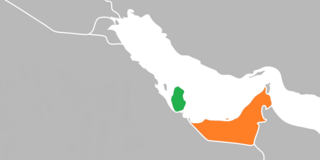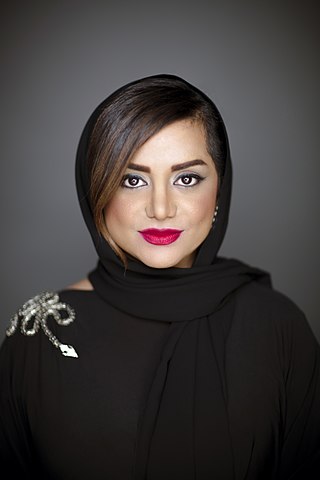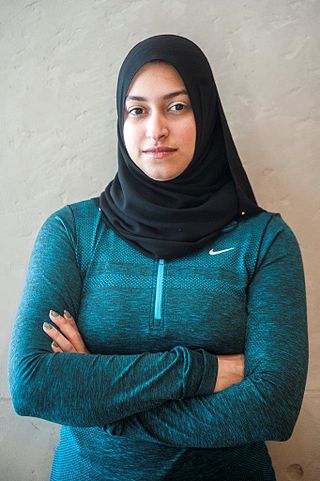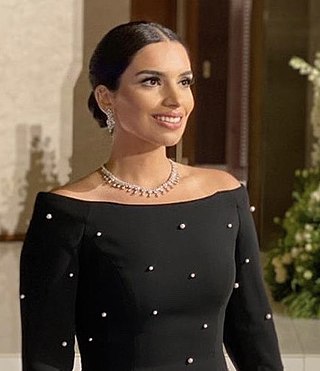Related Research Articles

The economy of the United Arab Emirates (UAE) is the 4th largest in the Middle East, with a gross domestic product (GDP) of US$503 billion in 2022.

The United Arab Emirates, or simply the Emirates, is a country in Western Asia. It is located at the eastern end of the Arabian Peninsula and shares borders with Oman and Saudi Arabia, while having maritime borders in the Persian Gulf with Qatar and Iran. Abu Dhabi is the nation's capital, while Dubai, the most populated city, is an international hub.

United Arab Emirates University (UAEU) (Arabic: جامعة الإمارات العربية المتحدة) is a public research university located in Al Ain, United Arab Emirates. Founded in 1976 by the country's first President, Sheikh Zayed bin Sultan Al Nahyan, it is the oldest university in the United Arab Emirates and offers courses in various subjects up to post-graduation.
According to human rights organisations, the government of the UAE violates a number of fundamental human rights. The UAE does not have democratically elected institutions and citizens do not have the right to change their government or to form political parties. Activists and academics who criticize the regime are detained and imprisoned, and their families are often harassed by the state security apparatus. There are reports of forced disappearances in the UAE; many foreign nationals and Emirati citizens have been abducted by the UAE government and illegally detained and tortured in undisclosed locations. In numerous instances, the UAE government has tortured people in custody , and has denied their citizens the right to a speedy trial and access to counsel during official investigations.

Emirates Integrated Telecommunications Company P.J.S.C., commercially rebranded as du in February 2007, is one of the two main telecom operators in the United Arab Emirates. du offers fixed line, mobile telephony, internet and digital television services across the UAE. It also provides carrier services, a data hub, internet exchange facilities and satellite service for broadcasters. It expanded its services in support of economic and social transformation of UAE and operates subsidiaries such as EITC Investment Holdings Limited, Edara, Smart Dubai Platform Project Company LLC and EITC Singapore PTE. LTD.

Human rights in Dubai are based on the Constitution and enacted law, which supposedly promise equitable treatment of all people, regardless of race, nationality or social status, per Article 25 of the Constitution of the United Arab Emirates. Despite this, Freedom House has stated: "Extreme forms of self-censorship are widely practiced, particularly regarding issues such as local politics, culture, religion, or any other subject the government deems politically or culturally sensitive. The Dubai Media Free Zone (DMFZ), an area in which foreign media outlets produce print and broadcast material intended for foreign audiences, is the only arena in which the press operates with relative freedom."
According to Human Rights Watch, there is substantial discrimination against women in the United Arab Emirates. The status of women has improved over the years. UAE performs better on metrics of gender equality than many other states in the Gulf region, and it has been making reforms to protect women's rights and empower women in different sectors. Critics describe some of these reforms as window dressing.

The Emiratis are the native Arab citizen population of the United Arab Emirates (UAE). Within the UAE itself, they number approximately 1.5 million.

The Culture of the United Arab Emirates is part of the culture of Eastern Arabia. Its historical population was a small tribal community that changed with the arrival of an influx of foreign nationals in the mid-20th century. Emirati culture is a blend of Arabian, Islamic, and Persian cultures, with influences from the cultures of East Africa and Indian Subcontinent. Islam has had a prominent influence on local architecture, music, attire, cuisine, and lifestyle.
Sheikha Fatima bint Mubarak Al Ketbi is the third wife of Sheikh Zayed bin Sultan Al Nahyan, the founder and inaugural president of United Arab Emirates. She is referred to as the mother of sheikhs, the mother of the UAE and as The mother of Nation.

Saudi Arabia – United Arab Emirates relations refers to the current and historical relationship between Saudi Arabia and the United Arab Emirates. Saudi Arabia maintains an embassy in Abu Dhabi and a consulate in Dubai while the U.A.E. has an embassy in Riyadh and consulate in Jeddah. Both countries are neighbours and as part of the Middle East and Persian Gulf region, share extensive political and cultural ties.

Qatar and the United Arab Emirates (UAE) share a naval border and are part of the Arabic-speaking Persian Gulf region. They are both members of the GCC.
The Emirates Environmental Group (EEG) is a non-governmental professional working group founded in 1991 in Dubai, United Arab Emirates (UAE).

Nāyla al-Khāja is the first female film writer, director and producer in the United Arab Emirates. Al-Khaja's films have screened at more than 42 film festivals worldwide.

Reem Bint Ebrahim Al Hashimy is an Emirati civil servant who is currently serving as the Minister of State for International Cooperation in the United Arab Emirates' Ministry of Foreign Affairs and International Cooperation.

Amna Al Haddad, is a female weightlifting athlete and former journalist from the United Arab Emirates.

Muna Easa Al Gurg is a businesswoman and philanthropist from the United Arab Emirates and is currently the vice chairperson and managing director of Retail at Easa Saleh Al Gurg Group.

Habiba Sayeed Alsafar is an Emirati geneticist, biomedical engineer and academic. She is an Assistant Professor of Biomedical Engineering at Khalifa University and is the Director of the Khalifa University Biotechnology Center.

Amina Taher is an Emirati airline marketing executive, businesswoman, and advocate for the empowerment of women. She is the sole female on Etihad Aviation Group's Executive Leadership Team. Taher joined Etihad in January 2013.
Maryam Mohamed Fatma Matar is an Emirati geneticist, medical researcher, and radio host, based in the United Arab Emirates (UAE). Matar is the first woman to serve as director-general in the government of Dubai and is the founder and chairperson of the UAE Genetic Diseases Association.
References
- ↑ Habiba Al Marashi President & CEO, Arabia CSR Network Archived 2018-03-13 at the Wayback Machine , Executive Women, September 2015.
- ↑ "Right mix of green and experienced". The National. 2011-12-23. Retrieved 2021-04-06.
- ↑ Butalia, Nivriti. "An Emirati woman to me is a symbol of ambition: Habiba Al Marashi". Khaleej Times. Retrieved 2021-04-06.
- ↑ "Habiba Al Marashi - Women as Global Leaders - Learning Leadership - 10 - 12 March 2008". www.zu.ac.ae. Retrieved 2021-04-06.
- ↑ "UAE environmentalists welcome Abu Dhabi's new single-use plastic policy". gulfnews.com. Retrieved 2021-04-10.
- ↑ Nongrum, Nonalynka. "Addressing the latest regulatory developments and best practices in the region". Oil Review Middle East (in Polish). Retrieved 2021-04-10.